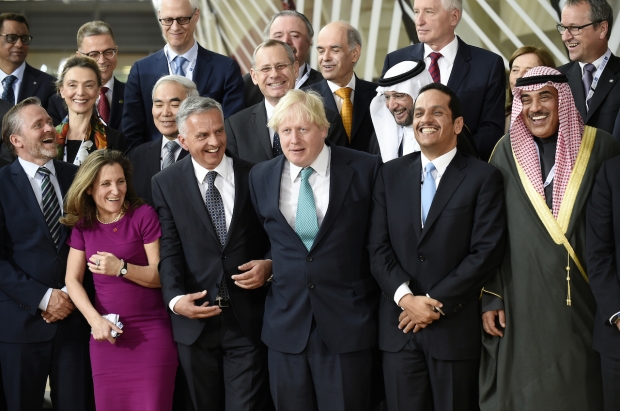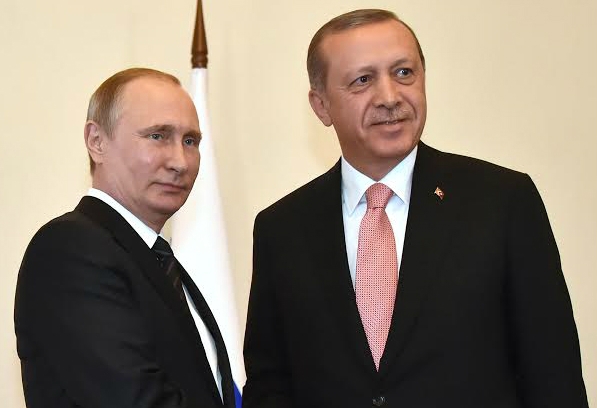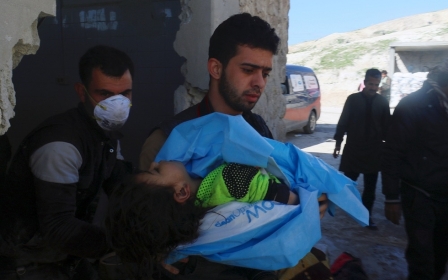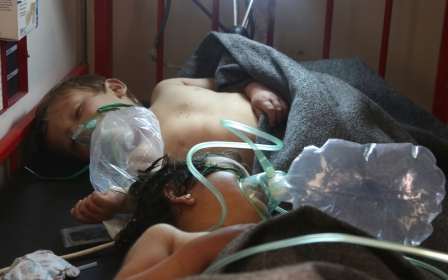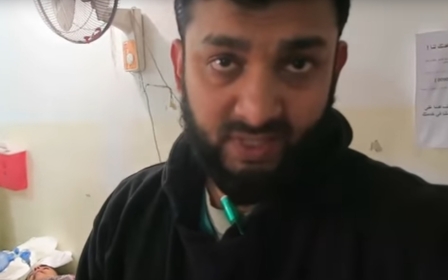ANALYSIS: With gas attack, Assad wants world to 'beg him' to stop
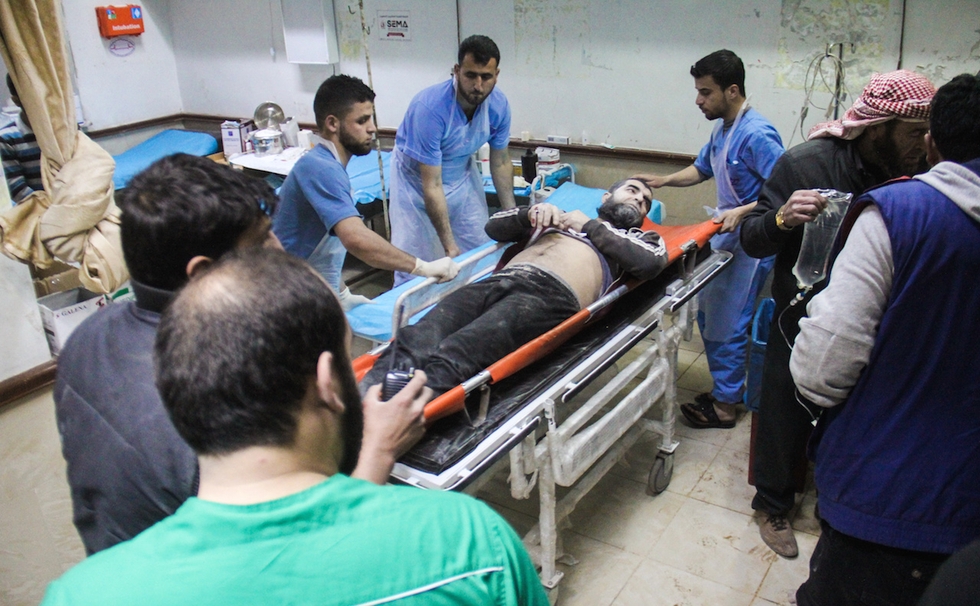
The chemical weapons attack that killed at least 70 in northern Syria on Tuesday has once again set international powers hand-wringing about whether action should be taken against Syrian President Bashar al-Assad's forces.
Similar to the aftermath of the far more deadly September 2013 chemical attack in the Damascus suburb of Ghouta, there have been calls for the government to "pay a price" for actions that a US government source have said was "almost certainly" carried out by forces loyal to Assad, a charge Syria has denied.
Others have speculated about why the Assad government would engage in such a provocative act at a time when he appears to be winning the six-year civil war.
One reason, said Jihad Yazigi, a visiting fellow at the European Council on Foreign Relations, is that the attack and the publicity it has generated will humiliate the international community and, once again, highlight its fecklessness over continuing civilian deaths.
"Assad wants the West to beg him to stop attacking civilians," Yazigi told Middle East Eye.
"Not for the sake of protecting civilians - since September 2013, we know that the fate of Syrian civilians is not of concern to anyone - but for the sake of ending the embarrassment that the attacks (or more exactly the lack of reaction to them) are causing to the West."
Some noted with surprise the speed and willingness of the Trump administration, otherwise seen as more sympathetic to the Assad government than Obama, to condemn and specifically attribute blame for the attack to his forces - though officials also said the continuation of Assad's government was a "political reality".
"Today's chemical attack in Syria against innocent people, including women and children, is reprehensible and cannot be ignored by the civilised world," said White House press secretary Sean Spicer at a daily briefing on Tuesday.
"There's not a comfort level with Assad. I think it's a political reality."
Officials from Qatar and Kuwait joined those from the EU, Norway and the United Nations in Brussels on Tuesday in order to organise efforts to increase humanitarian aid in Syria, but their conference was largely overshadowed by the attack.
While Federica Mogherini, high representative of the European Union for foreign affairs, was quick to announce at the conference that Assad had "primary responsibility" for the Idlib attack, few countries present appeared clear on what to actually do next.
"It depends what the international Western community wants," said Yazigi. "If it wants to have any leverage, if it is genuine about a political track, if it wants to restore some legitimacy to international humanitarian norms, the only option is the use of force, either directly or through the FSA.
"If it just wants to stop the embarrassment of being naked in its impotence, it will acquiesce to Assad's demands."
'After six years of carnage, there is little reason to believe a single incident would move the US to action'
- Tobias Schneider, defence policy analyst
Tobias Schneider, a defence policy analyst, said that the attack is part of a slow intensifying of assaults on civilian areas in Idlib and reflects a long-standing government tactic to "punish and destroy pockets of civil and military resistance to its rule and displace civilians in the run-up to military offensives".
"Diplomatically, the act of using nerve gas accomplishes two things for the regime," Schneider told MEE. "It tests the resolve of a new and chaotic US administration while throwing just enough of a wrench into international negotiations to prevent any collusion by world powers dangerous to Assad’s maximalist ambitions.
"Overstepping not just the red line, but brazenly violating the subsequent agreement negotiated by Russia and Obama, establishes that Damascus does not consider itself subject to foreign settlements."
He added that while Trump is unlikely to propose any direct confrontation, the lack of any action would hardly differ greatly with the policy of the Obama administration.
"The United States has made it abundantly clear it is not interested in any kind of direct military confrontation with the Syrian regime," said Schneider. "After six years of carnage, there is little reason to believe a single incident would move the US to action."
End of the Astana process?
The attack is likely to strain ongoing peace negotiations. Rebels boycotted the last attempt to hold talks in the Kazakh capital of Astana in mid-March, but an agreement was made between Russia, Turkey and Iran, who are sponsoring the negotiations, to meet again in early May.
This attack could throw a spanner in the works, however, and undermine nominal ceasefire agreements decided between the three powers and proxies.
Nursin Guney, head of the international relations department at Istanbul’s Yildiz Technical University, told MEE that the attack "could spell the end" of the Astana process.
"But we also have to remember that there have been regular violations of the ceasefire using conventional weaponry as well so if Astana ends, it will be because of a build-up rather than this single incident,” she said.
Turkish Foreign Minister Mevlut Cavusoglu called the attacks “a crime against humanity".
Conversely, Russian defence ministry spokesman Igor Konoshenkov claims the deaths were a result of Syrian jets striking rebel workshops which "produced chemical munitions".
But despite apparently being at odds over the attack and the burden of responsibility for it, Guney said she did not suspect it would have a major impact on their diplomatic relations.
“Turkey and Russia have issues they agree on and issues they disagree on," she said. "This will be one of those where they don’t see eye to eye.
“But this is an international issue and needs an international response."
'Dismay' among opposition
Mohamed Okda, a political consultant who regularly speaks with Syrian rebels, said that their reaction to the attacks basically amounted to "dismay, but not much surprise".
From their perspective, he said, the US basically gave Assad "the green light" to conduct the attack after they said that his removal was no longer a priority.
"The message from the US administration to Assad is that 'You can kill half a million of your own people and you can kill more and you can stay in power'," he said.
Okda said that one of the main frustrations among negotiators in Astana had been the absolute lack of an American or Western presence, while "Russia was in the driving seat".
"They would like to see [the US] more involved and more in the driving seat more than Russia, but unfortunately they're not expecting this under the current US administration and the current situation in Europe with Brexit and elections in France and other places," he explained.
"Assad and the Russians are going after Idlib and the message is: 'You will have to leave, or we will use any means to clear Idlib of the rebels'."
Middle East Eye propose une couverture et une analyse indépendantes et incomparables du Moyen-Orient, de l’Afrique du Nord et d’autres régions du monde. Pour en savoir plus sur la reprise de ce contenu et les frais qui s’appliquent, veuillez remplir ce formulaire [en anglais]. Pour en savoir plus sur MEE, cliquez ici [en anglais].


